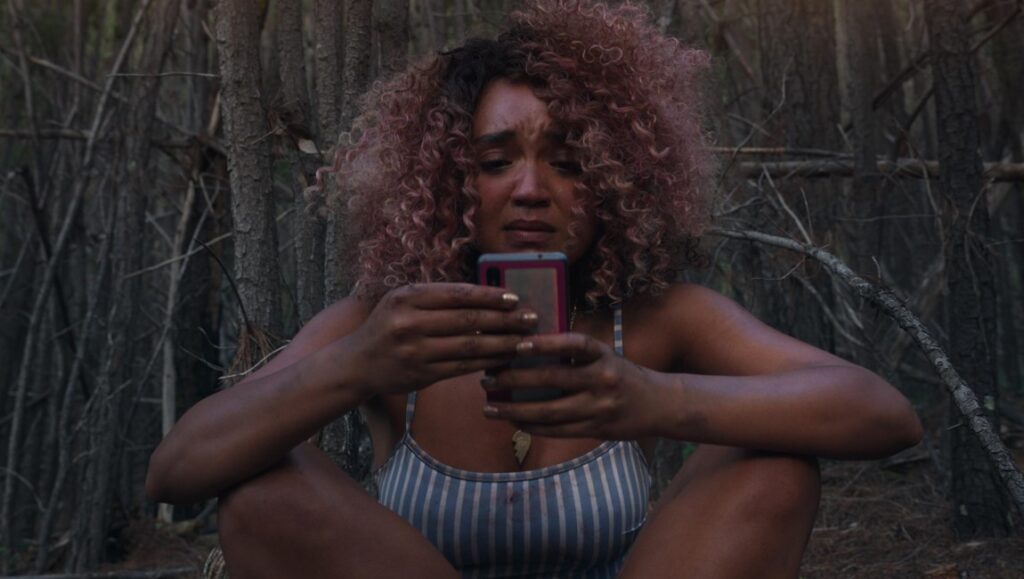Sissy wants to have its cake and eat it too, but all of its many ingredients don’t add up to anything new or satisfying.
Viewers of a certain age might remember the SNL character Stuart Smalley and his frequently spouted catch phrase, “I’m good enough, I’m smart enough, and doggone it, people like me.” Filmmakers Hannah Barlow and Kane Senes presumably do, putting an almost verbatim mantra in the mouth of Cecilia (Aisha Dee), a 20-something social media influencer and the protagonist of their new dark comedy slash psychological thriller cum horror film Sissy. Cecilia is introduced recording a video for her 200,000+ followers that finds her meditating and illustrating how to make one’s very own safe space with a rope, before pausing to hawk some facial cleanse products. After she wraps up, the camera proceeds to follow her around her filthy, cluttered apartment. The point is clear: Cecilia isn’t as centered and put together as she pretends to be. Instead, she lounges on her couch watching bad reality TV, glued to her phone as the likes and comments come pouring in. She’s addicted to her own feed, desperate for the validation she receives with each new post. Is she a huckster, a fraud, a charlatan? For her part, Dee is a remarkably charming performer, investing Cecilia with a very real humanity that butts up against the social media satire on display. Regardless, the filmmakers keep Cecilia’s true nature vague, to increasingly diminishing returns.
Sissy’s plot kicks in when Cecilia runs into an old friend, Hannah (played by co-writer/director Barlow) at a grocery store. The two were inseparable as adolescents (back when Cecilia still went by her nickname, Sissy), until something caused a schism between them. Now, a decade later, Hannah is eager to reconnect, immediately inviting Cecilia first to a karaoke party and then to her bachelorette weekend getaway. Cecilia is reluctant, but decides to go; also attending is Hannah’s fiancé, Fran (Lucy Barrett), and a few hip, fashion-obsessed friends. Unfortunately, this weekend getaway is being hosted by Alex (Emily De Margheriti), Cecilia’s childhood bully and the cause of the rift between Cecilia and Hannah. Barlow & Senes parcel out this background information in brief, oblique flashbacks that gradually expand as the narrative progresses. Much like Cecilia’s true character, our understanding of these scenes fluctuates as the audience receives more and more information, reconfiguring sympathies and throwing into question who, exactly, was the instigator.
It’s hard to pinpoint exactly what doesn’t work about Sissy, as the dark, cringey humor eventually gives way to a full-blown slasher film. Cecilia becomes increasingly uncomfortable around her host, as Alex makes it clear that Cecilia isn’t really welcome here. The filmmakers underline the gap between the parties by grouping Hannah and the others together into shots while keeping Cecilia separated by edits or by the architecture of the frame. But is Alex really a bully, or does she have a good reason to distrust Cecilia? It would be a disservice to unsuspecting audiences to give too much away here; suffice to say that emotions flare and the party goers begin meeting unnatural ends, leading to some stunningly violent set pieces. But it’s a hollow kind of violence, good for a few shocked guffaws but lacking any real teeth. Ultimately, it’s the absence of any consistent point of view that seems to doom the film. Barlow and Senes appear prepared, eager even, to take the piss out of contemporary Internet culture, gently mocking “safe spaces” and “trigger warnings.” But they also want us to sympathize with Cecilia; she is, after all, very clearly the victim of bullying, and the film carefully delineates how crass her peers are. The fact that Aisha Dees is Black adds a racial dimension to the violence that the filmmakers don’t seem interested in exploring, ditto the fact that the other main characters are a pair of soon-to-be-married lesbians, an Asian woman, and a disabled gay man. The film is chock full of contemporary cultural signifiers and Internet buzzwords that all add up to very little. In fact, if one were to take any of the film’s musings on mental health seriously in any way, it’s borderline offensive. None of this might matter if the sharp turn to horror brought genuine scares along with it, but despite the ample viscera on display, there’s no real tension or suspense there, either. Sissy wants to have its cake and eat it too, vacillating wildly between a good-faith exploration of childhood trauma, psychological realism, and a schlocky gore-fest with exploding heads and mangled limbs. All the ingredients are there, but they don’t add up to anything delicious.
You can stream Hannah Barlow & Kane Senes’ Sissy on Shudder beginning on September 29.
Originally published as part of SXSW Film Festival 2022 — Dispatch 2.


Comments are closed.